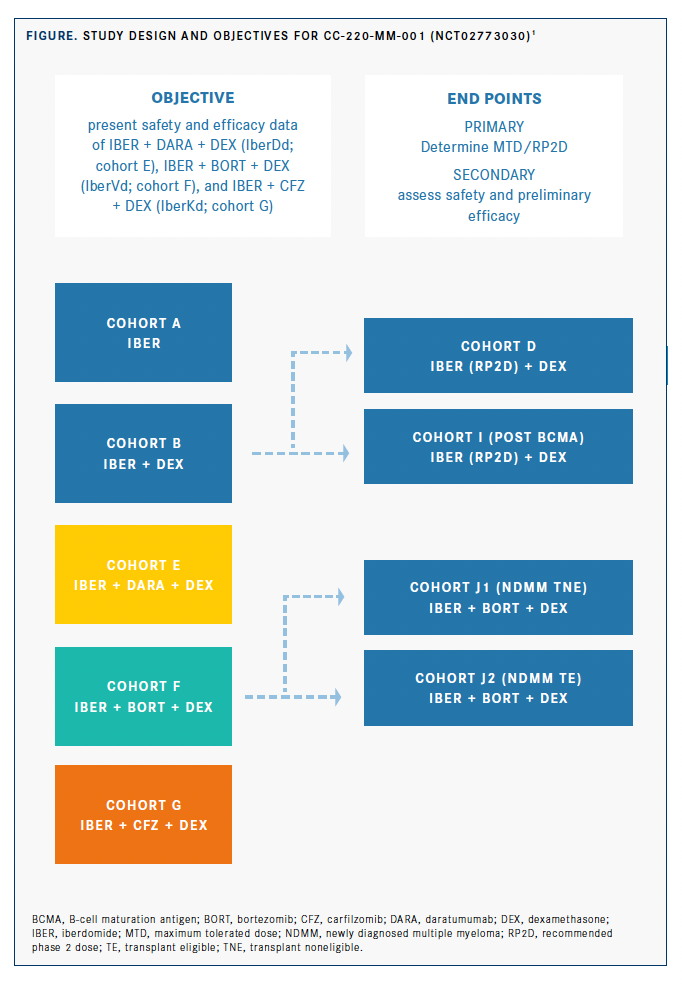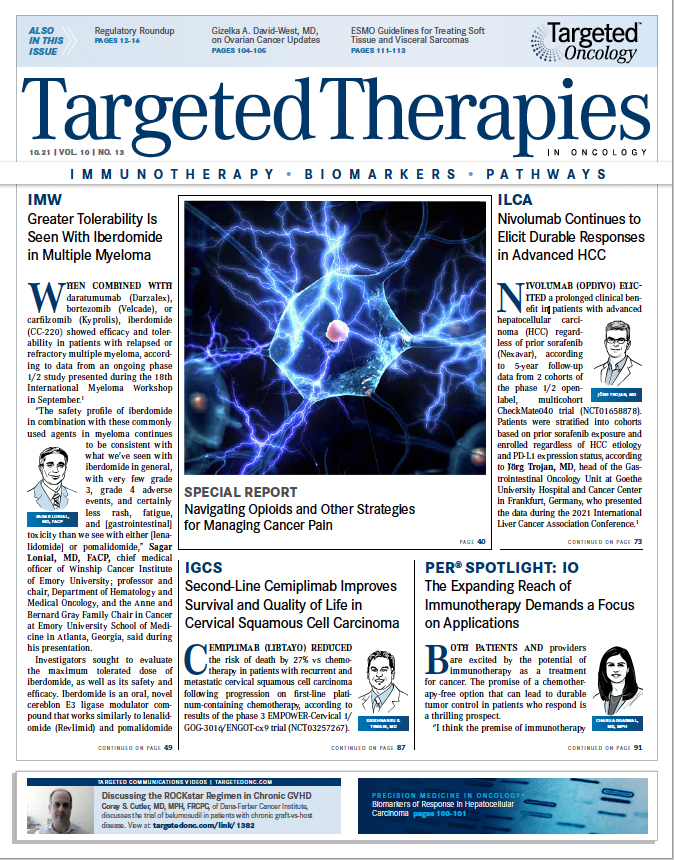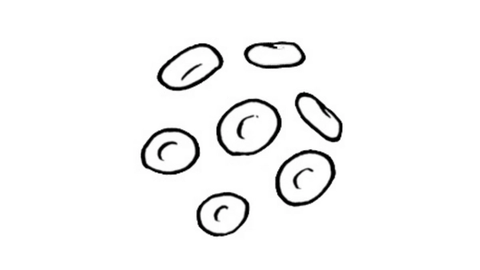Greater Tolerability Is Seen With Iberdomide in Multiple Myeloma
Results from CC-220-MM-001 trial support further research of iberdomide-based regimens in multiple myeloma that investigators hope will lead to phase 3 randomized trials and eventual FDA approval of iberdomide in these combinations.
Sagar Lonial, MD, FACP

When combined with daratumumab (Darzalex), bortezomib (Velcade), or carfilzomib (Kyprolis), iberdomide (CC-220) showed efficacy and tolerability in patients with relapsed or refractory multiple myeloma, according to data from an ongoing phase 1/2 study presented during the 18th International Myeloma Workshop in September.1
“The safety profile of iberdomide in combination with these commonly used agents in myeloma continues to be consistent with what we’ve seen with iberdomide in general, with very few grade 3, grade 4 adverse events, and certainly less rash, fatigue, and [gastrointestinal] toxicity than we see with either [lenalidomide] or pomalidomide,” Sagar Lonial, MD, FACP, chief medical officer of Winship Cancer Institute of Emory University; professor and chair, Department of Hematology and Medical Oncology, and the Anne and Bernard Gray Family Chair in Cancer at Emory University School of Medicine in Atlanta, Georgia, said during his presentation.
Investigators sought to evaluate the maximum tolerated dose of iberdomide, as well as its safety and efficacy. Iberdomide is an oral, novel cereblon E3 ligase modulator compound that works similarly to lenalidomide (Revlimid) and pomalidomide (Pomalyst) from a targeting standpoint but differs in that it binds cereblon more tightly and has greater potency. It also has tumoricidal activity as opposed to tumoristatic activity.
“In addition to that, the downstream impacts of binding cereblon are certainly very different with iberdomide than [what] we see with lenalidomide and pomalidomide,” Lonial said. “And from a practical and a clinical perspective, it’s very clear that iberdomide is able to overcome resistance to both [lenalidomide] and pomalidomide, suggesting that, unlike other second- and third-generation agents, this may actually be able to overcome drug resistance of some of its predecessors.”
In phase 1 of the CC-220-MM-001 (NCT02773030) trial, investigators evaluated the safety and efficacy of iberdomide. Lonial shared data for cohorts E, F, and G, as data for cohorts A and B (single-agent iberdomide and iberdomide plus dexamethasone, respectively) are not yet available (FIGURE1). Cohorts E, F, and G received iberdomide plus dexamethasone in combination with daratumumab (IberDd; n = 43), bortezomib (IberVd; n = 25), and carfilzomib (IberKd; n = 9), respectively.
In terms of the safety profile, notable hematologic grade 3/4 treatment-emergent adverse events (TEAEs) were neutropenia (67%), leukopenia (23%), anemia (21%), and febrile neutropenia (5%) within the IberDd cohort; neutropenia (28%) and thrombocytopenia (24%) in the IberVd cohort; and lymphopenia (44%) and neutropenia (33%) for patients receiving IberKd. Nonhematologic TEAEs were few, with several patients experiencing grade 3/4 fatigue, rash, and gastrointestinal disorders.
“I think really the take-home message is that few patients were discontinued because of adverse events,” Lonial said.
Extramedullary plasmacytomas occurred in 16% of patients in the IberDd cohort, 16% in the IberVd cohort, and 22% in the IberKd cohort.
Baseline characteristics of patients within the 3 cohorts were standard and expected, with a median time since diagnosis of 6.5 years. More than one-third of patients were triple-class refractory.
Overall response rate was 46% in patients receiving IberDd, 56% in IberVd, and 50% in
IberKd. There was a very good partial response or better in 24%, 28%, and 38% of patients within the 3 cohorts, respectively.

“Iberdomide clearly does combine very nicely with [daratumumab], bortezomib, or carfilzomib, and shows a favorable safety profile, particularly in patients with heavily pretreated relapsed refractory multiple myeloma,” Lonial concluded. “[Although] the real goal of this trial was to demonstrate the maximum-tolerated doses of both agents given together, what I think we’re seeing is very encouraging efficacy signals as well.”
The results support further research of iberdomide-based regimens in multiple myeloma that investigators hope will lead to phase 3 randomized trials and eventual FDA approval of iberdomide in these combinations.
REFERENCE:
Lonial S, Richardson PG, Popat R, et al. Iberdomide in combination with dexamethasone (DEX) and daratumumab (DARA), bortezomib (BORT), or carfilzomib (CFZ) in patients (pts) with relapsed/refractory multiple myeloma (RRMM). Presented at: 18th International Myeloma Workshop; September 8-11, 2021; Vienna, Austria. Oral Abstract Session.









